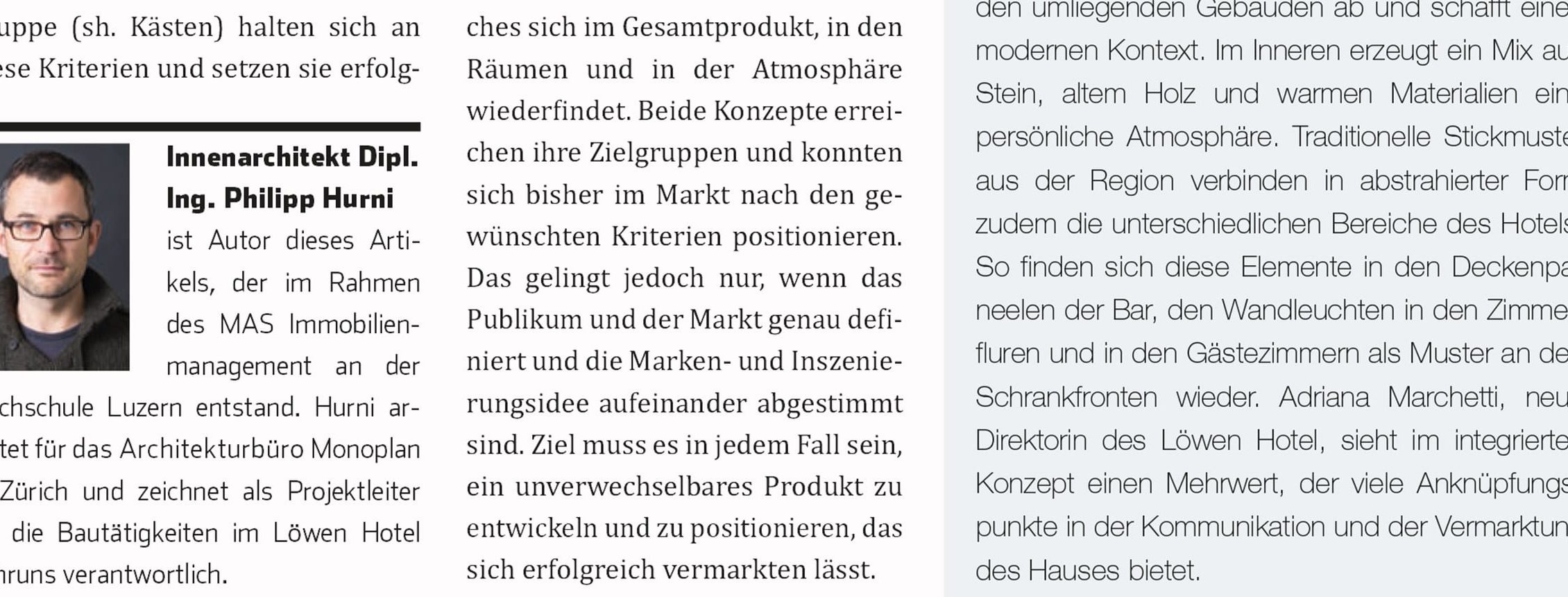
April 2014 | Publications, Team
Masters in staging
As part of his dissertation for his MAS in Real Estate Management, one of our team members, Philipp Hurni, wrote an article on the integration of architecture and design in the context of holistic approaches to contemporary hotel concepts. The article was published in Top Hotel 6/2014. We would like to congratulate Philipp on obtaining his MAS and on the publication of the article.
MASTERS IN STAGING
Through integrating architecture and design into the marketing concept, more and more hotels are turning into brands with a holistic approach. Harmonising the design stage with the branding concept enables operators to market the hotel as a product that has been stylised down to the last detail.
The guest’s perception of the brand starts when they visit the website. Like a thread, it weaves its way through the booking process and day of arrival to the day the guest checks out. There are all manner of factors that influence this perception. If these factors are harmonised in the best possible way, they act as a powerful force of attraction for the guest. The greater a hotel succeeds in targeting and triggering this force of attraction, the more harmonised the guest perceives their stay at the hotel. And in the ideal case, the guest becomes a regular. Implementing such an integrated strategy requires precise knowledge of the requirements of the core clientele and of the corporate identity that the hotel wants to achieve. Contradictions arise when the international operator builds a hotel in the mountains, the design comes from London, the gastronomic offering comprises an Asian restaurant and a fish restaurant, and the images in the brochure whisper promises of regional and Alpine flair. “The easier it is to recognise the profile of the hotel, the easier it is for the guest to decide upon that hotel,” explains Martin Hilzinger from Swiss consultancy firm Trimarca. In his view, if a hotel has a clear-cut identity, it also acts as a sort of guideline for devising an effective and efficient market cultivation strategy. As the concept greatly influences the work of architects and designers, and lays the foundations for a successful project, it is up to the client to define it. This, in turn, helps to merge the contextual parameters and the aspirations for how the company wants to be represented. On the other hand, implementing the concept is the task of the architects and designers. They must strive to integrate the building into the context and to position the idiosyncratic architectural style as an expression of a specific identity. This manifests itself in the comfort of the rooms, the long-range and close-range appearance of the hotel, and the colour scheme and choice of materials, all of which act as carriers of the marketing message, which in turn acts as a link to the brand.
Both the Löwen Hotel in Montafon and the 25hours hotels adhere to these criteria and manage to implement them successfully. The amplification and staging of that which is typical for the country and the transformation of these attributes translate the brand strategy of the Löwen Hotel into a modern contemporary language. The concept of the 25hours Hotel in Berlin aims to reflect the complexity of the city and, in its implementation, stages it with collage-like imagery. This makes it possible to recreate the attitude to life of an urban audience, which is reflected in the overall product, in the rooms and in the atmosphere. Both concepts reach their target audiences and, so far, have been able to position themselves on the market based on the desired criteria. However, this is only possible if the target audience and the market have been clearly defined, and the branding and staging idea are harmonised with each other. In any case, the aim must be to develop and position a unique product that can be marketed successfully.
CONCEPT EXAMPLE: LÖWEN HOTEL MONTAFON
The Löwen Hotel in Schruns (Montafon, Austria) opened in November 2013 following a six-month conversion period, and from the outset, was planned based on a fully integrated strategy. After the hotel underwent a management restructuring, the owners decided upon a complete refurbishment. In addition to the constructional changes, the “neue Löwe” (new lion) was also to be repositioned on the market. The aim was to carve out the traditional character and create a strong connection to the region, and to make the hotel interesting for both holiday guests and day guests. At the start of the project, Zurich-based architecture and design company Monoplan and Munich-based advertising agency For Sale developed a concept that would trigger the desired attractions of regionality, ambiance and the Montafon area for the guests. During the process, the slogan “Zu Gast bei Freunden in einem Landhaus in Montafon” (Visiting friends in a country house in the Montafon region) was coined. Thereafter, it became a leitmotiv for all areas of the hotel, and is reflected in the architecture, in the interior design and in the branding. The concept plays with the key words “regionality”, “elegance”, “modern comfort” and “Alpine chic”; once the project is complete, the new architectural style of the Löwen Hotel will blend in splendidly with the Alpine setting and local scenery of the Montafon. Thanks to its colouring, the classic façade subtly stands out from the surrounding buildings, thus creating a modern look and feel. Inside, a combination of stone, ancient wood and warm materials creates a personal atmosphere. The different areas of the hotel are connected by abstracted patterns of traditional regional embroidery designs. These elements can be found in the ceiling panels of the bar, in the wall lights in the corridors, and in the guest rooms as patterns on the wardrobe doors. Adriana Marchetti, the new manager of the Löwen Hotel, believes an integrated concept creates added value – providing many opportunities for creating links to the communications and marketing strategy of the hotel.


